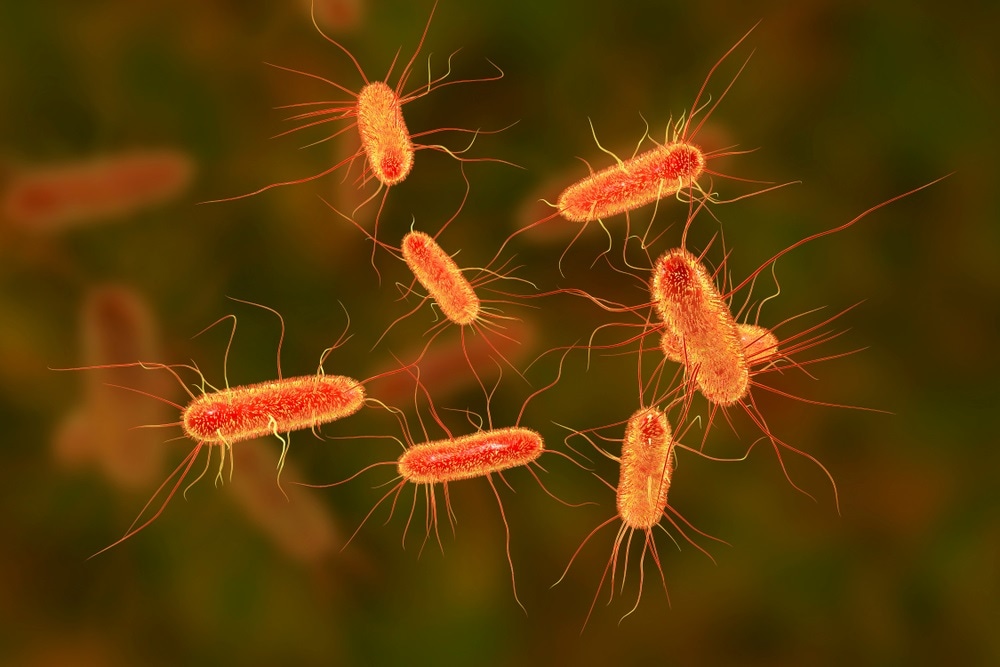Researchers in the US have developed a new therapy that uses a unique bacteriophage to treat E. coli infections. The bacteriophage was found to be similar in its effectivity against infection in comparison to the standard antibiotic treatment. In addition, it did not have the same detrimental effects on the gut microbiota that is characteristic of antibiotic use.
 Image Credit: Kateryna Kon / Shutterstock.com
Image Credit: Kateryna Kon / Shutterstock.com
E. coli contamination can be fatal
Escherichia coli, more commonly known as E. coli, is contracted through the ingestion of contaminated water or food, which introduces the bacteria into the gut or the infected person. Infection usually isn’t fatal, and symptoms include abdominal cramps, diarrhea, and vomiting.
However, there are numerous strains of the E. coli bacteria, some more severe than others, which can lead to kidney failure called hemolytic uremic syndrome (HUS) and sometimes death.
The US has a history of serious E. coli outbreaks, mostly related to specific food products that have threatened the health of those who consumed them. 2006 saw one of the worst cases of an E. coli outbreak, with almost 200 people over 26 states becoming infected due to a strain of E. coli in prepackaged spinach.
The outbreak resulted in the deaths of 3 people and the development of HUS in 31 people. This was followed by eight people being hospitalized in 2017 due to eating contaminated SoyNut butter, and five deaths in 2018 from the consumption of contaminated romaine lettuce. This year almost 200 people have fallen ill due to eating contaminated beef.
Drawbacks of treating infection with antibiotics
While E. coli infection is considered to be treatable, severe strains present a real threat to health, and many thousands of people contract some form of the bacteria each year that leads them to seek treatment.
The current method of treating these infections relies on administering antibiotics to kill the bacteria. However, there is a major drawback of this method, in that it is not specific to destroying the E. coli bacteria and also damages the gut microbiota. These are essential bacteria that are crucial for the functions of enzyme, vitamin and amino acid synthesis, nutrient and mineral absorption, and production of short-chain fatty acids.
In order to address this major disadvantage of using antibiotics, a team of researchers at the University of Florida innovated a way to use bacteriophages to treat E. coli infections. Bacteriophage therapy is an established method of treating pathogenic bacterial infections by exploiting the function of viruses, using them to specifically target bacterial infections, having no impact on other organelles or the host.
The scientists wanted to explore the potential efficacy of the method in treating E. coli, with the aim of developing a method free of the side effects of damaging the gut microbiota.
Promising results
The US-based team was able to show that using their Escherichia coli/Salmonella spp./Listeria monocytogenes-targeting bacteriophage cocktail, which they named “Foodborne Outbreak Pill” (FOP), they were able to achieve a similar therapeutic effect as that of ampicillin therapy (antibiotic therapy).
The results demonstrated that the antibiotic method was able to reduce pathogen counts by 79%, and the FOP method was able to decrease pathogen counts by 54%, showing that the two have similar effectiveness.
More studies would have to be conducted to corroborate results and to calculate just how effective the FOP method is, but what’s exciting is that the method not only seems to work at a similar level as antibiotics but without the drawback of damaging the gut microbiota.
The study showed that gut microbiota profiles for the FOP group were unchanged, whereas antibiotics distorted the gut microbiota composition, which had only partially recovered by day 10.
Source:
Dissanayake, U. et al. (2019). Bacteriophages Reduce Pathogenic Escherichia coli Counts in Mice Without Distorting Gut Microbiota. Frontiers in Microbiology. DOI: 10.3389/fmicb.2019.01984